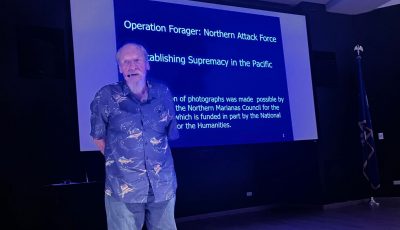I donut niid edukashun; I hab kommon cents
Editor’s Note: The following is being published as a series due to its length.
Over on Rota more than 20 years ago, we were hit by Typhoon Pongsona. Amongst the damage done, the gym in Songsong was badly hit. The person, whose responsibility was the gym, missed the deadline for a FEMA grant to repair it, which would once again have made it usable. For 20 years the gym was not available to the community and eventually it was “given” to PSS with the hope that they would be able to repair it within the scope of their budget. Did this responsible person exhibit common sense? No. Does he think or say he has common sense? Probably. Can Rota afford many more mistakes like this one? Certainly not.
Please think about it.
“I’ll do my best.” So, it’s 200 years ago, you’re living on Saipan and, as the man of the house at the start of the day, you begin to depart home, saying to your wife, “I’m going to fish, hunt, and gather.” She’d say, “Don’t forget—the neighbors are joining us for dinner!” And you’d reply, “I’ll do my best!” And you wife would roll her eyes upward, smile, and shake her head. How many times had she heard that followed by a sparse meal?
Two hundred years ago, there were lots to fish to hunt and harvest on Saipan. “Doing your best” fit with the availability. But life is different now. Even the jobs that pay only a little more than minimum wage require Russian, Korean, Japanese, or Mandarin. But our kids have a hard time after graduation speaking, writing, and reading English. Many can hardly add, subtract, multiply, or divide but every job requires basic math at some level. But PSS says it’s doing its best and exceeding expectations! But the problem is highly exacerbated in government positions (i.e. department heads) that are appointed and not competitively filled. “Local” is not really a qualification. For the unqualified, doing their best just isn’t good enough. If they really wanted to do their best, they would return to school, preferably university, and study in the area in which they hope to get appointed or an area that’s their passion and needed in the CNMI. We need people with a graduate degree in Economics (undergrad is incomplete), or undergraduate degrees in urban planning, natural resource management, marine science, finance, accounting (the stuff of becoming a CPA, not a bookkeeper), and attorneys? Nope, we have plenty.
“I think that it’s time for me to serve the people.” Really, this is your reason for running for elected office? It begs the question: What have you been doing all this time up to the present? Have you not been serving the people? In my experience, it is very difficult to shift allegiances from family and friends and yourself, to “the people.” In fact, the elected office simply serves as a platform to continue to serve your family, friends, and yourself. Not exactly what I would call a “public servant” and it is what has gotten us into so many problems in the past with unqualified people hired, bribes taken, and such.
You can trust me, I’m sincere. In the early 1900s, one of the most qualified nurses in the Chicago area went to work at Chicago’s largest hospital. She was working the 11pm to 7am shift in the maternity ward. A large hospital equals a lot of babies. By the end of her shift, every baby had died. At the scheduled feeding time, she removed a bottle from the cabinet but took a bottle of cleaning solvent rather that baby formula (this will likely never happen in one of our hospitals today—the checks and balances are too well-defined) and fed it to each baby. She was sincere but she was sincerely wrong.
In the 1950s, Egypt undertook its largest infrastructure development project in history: the building of the Aswan Dam on the Nile River. The purpose of the dam: electrical generation. It was a project contracted to the Soviet Union and some of its brightest designers, engineers, and mathematicians. The projected cost was US$3 billion. When the dam was completed and was being filled, they discovered that it would never fill (and the hydro-electric generating targets never reached). You see, at the three-fourth level, the amount of water entering the reservoir equaled the amount of water evaporating from the surface of the reservoir. The Soviet scientists failed to calculate the evapo-transpiration rate of the reservoir’s surface area. Three more dams had to be constructed to regain the electrical target as an additional cost of US$3 billion. Sincere, but way off the mark.
A much-needed bridge was built over the Columbia River, which connected Oregon and Washington. Everyone was so very pleased and proud at its completion. But when the wind arose—common at the mouth of the Columbia Rive—the bridge began to move harmonically, like the waves in the ocean. Within minutes, the bridge was completely destroyed! The engineers neglected to consider wind-bridge harmonics. Again, their sincerity was not in question
To be continued
Arnold J. Mesa
Chinatown, Saipan



























